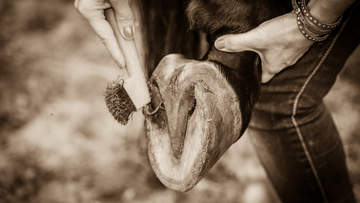What is Canker in Horses?
Canker is a chronic condition affecting horses' hooves. Horses suffering from canker develop foul-smelling, incredibly painful soft tissue in the frog and sole of the hoof.
Canker in horses is caused by a bacterial infection that can be contracted in unsanitary environments. Additionally, horses who do not receive proper hoof hygiene can develop Canker.
Most vets can diagnose canker through a physical examination. Sometimes, your vet may also order imaging to view the hoof better.
 Canker is challenging to treat once developed. It will take multiple treatment methods and time to cure it. Prevention is the best choice when possible.
Canker is challenging to treat once developed. It will take multiple treatment methods and time to cure it. Prevention is the best choice when possible.
Symptoms of Canker
The symptoms of canker in horses are:
- Foul odor
- Abnormal tissue growth
- Tissue discoloration
- Discomfort
In severe cases, a horse can develop lameness from the damage to the hoof, frog, and surrounding tissue. If left untreated, permanent damage to the hoof can occur.
Causes and Risk Factors
Canker develops from a bacterial infection due to unsanitary conditions. Horses can also contract it from other infected horses. Horses regularly exercising in damp or muddy conditions are more likely to develop canker.
Other risk factors can include:
- History of hoof injuries
- Poor blood circulation to the hoof
- Exposure to an infected horse
- Exposure to damp, muddy conditions
- Poor hoof conformation
Diagnostic Methods
Physical Examination
Your veterinarian will perform a physical examination of the hoof. She will look for discharge, abnormal tissue growth, and swelling. The foul smell will be obvious to the veterinarian.
Laboratory Tests
Your veterinarian may order bloodwork to check for signs of infection. Swabbing the infected area will also help identify the specific bacteria infecting the hoof.
Imaging
Your veterinarian may order X-rays or CT scans to obtain a clear image of the affected area. Ultrasounds can also help show the extent of the infection in the tissues.
Treatment Strategies
Medicinal Treatments
Your veterinarian will prescribe antibiotics to help fight the infection. She will also prescribe medicine to help manage pain and inflammation. You will be asked to regularly clean the hoof and keep your horse in a clean, dry area while the hoof heals.
Surgical Interventions
In severe cases, surgery may be necessary to remove the affected tissue. Experienced veterinary surgeons will utilize lasers to remove the infected tissue safely.
Aftercare and Management
Horses who have suffered from canker are likely to experience it again. Keep the hoof clean and avoid damp and muddy areas to prevent recurrence. Moreover, watch carefully for signs of recurrence. Repeated cases of canker can lead to permanent lameness and damage.
A proper diet and exercise can promote overall health and circulation to protect the hooves. By careful monitoring, proper hoof care, and maintaining a clean environment, your horse should have healthy hooves for the rest of their life.






















